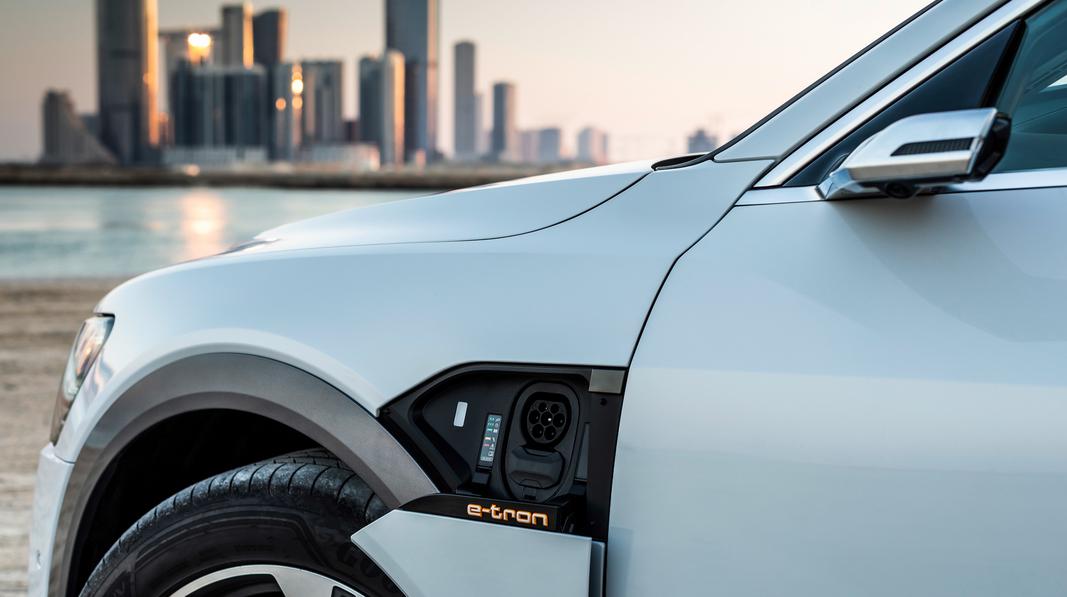Audi is involved in the EEBUS initiative to promote networking across manufacturer and industry boundaries. The Audi e-tron is the first electric car whose charging system uses the new communication standard.
At the “Plugfest E-Mobility” event at the Audi plant in Brussels, developers tested cross-industry compatibility before the EEBUS standard for energy communication is introduced this month.
The electric car will play an important role as a power consumer in the digital energy world. As an energy storage device, the electric car has great potential to drive the energy transition forward and absorb peak loads resulting from regenerative generation.
Cars are stationary for most of the day, which leaves a great deal of time for flexible charging. Because of this, the new power consumers not only present an additional load on the power grid, but can potentially serve as flexible storage devices in the context of the variable availability of solar and wind power.
Inside a building, electric cars and household appliances, heat pumps, and other consumers can coordinate their particular power requirements, thereby preventing overloads.
However, this requires all large power generators and consumers to be connected in order to ensure intelligent control of power requirements.
This is precisely what the EEBUS initiative has defined as its goal: Seamless and cross-industry communication in the energy system of the future.
Audi is working together with more than 70 international companies to create the common language for energy management in the Internet of Things.
During the two-day “Plugfest E-Mobility” on January 28 and 29, EEBUS members tested their developments on the basis of the open communication standard at the Audi plant in Brussels.
Developers and engineers will perform model tests to check whether the photovoltaics system, the charging infrastructure, the electric car, and the heating system can communicate without interference.
The devices are connected via what is known as a home energy management system (HEMS). All the information runs together in this control centre, which allows all energy-relevant devices to exchange information on their electricity requirements.
Following the “Plugfest,” the companies involved passed the EEBUS specification for the area of e-mobility.
Audi offers various solutions for charging at home. In its highest expansion stage, the optional connect charging system allows a charging capacity of up to 22 kW. It then takes only around four and a half hours to fully charge the Audi e-tron.
The benefits of the system are obvious: With the connect charging system, the Audi e-tron can always be charged with the maximum output possible with the home electrical system and the car.
The system also considers the power requirements of other consumers in the household and adjusts accordingly to prevent overloading the home electrical system and thus tripping the breaker.
This presumes that the home is equipped with a compatible HEMS to which the charging system connects via the home’s Wi-Fi network.
In this context, Audi is cooperating with two partner companies, SMA Solar Technology and Hager Group, both of which are also implementing the standard of the EEBUS initiative.
In combination with the connect charging system and an appropriately equipped HEMS, the Audi e-tron also takes advantage of variable electricity rates.
It can charge the battery when electricity is less expensive while simultaneously considering the customer’s mobility requirements, such as departure time and charge level.
The connect charging system gets the necessary rate information either from HEMS or from information the customer enters into the myAudi portal.
If the home is equipped with a photovoltaic system, the customer can also optimise the charging process to prefer the electricity generated by the system for charging the Audi e-tron.
The electric SUV does this by considering either forecast phases of sunshine or the current flow of electricity at the home’s connection point to the public grid.
It is conceivable that EEBUS devices will interact with the power grid to an even greater extent in the future. An interface with the grid operator via HEMS is one possible application.
This would allow electric cars to even better adapt their charge planning to grid bottlenecks and ensure that the power grid is stable, for example if multiple electric cars are charging on the same road simultaneously.
The specifications of the communication standard were rolled out at the beginning of February 2019.
The EEBUS initiative is thus on its way to introducing a Europe-wide standard that connects all major power consumers in the home in a comprehensive and manufacturer-independent way.

